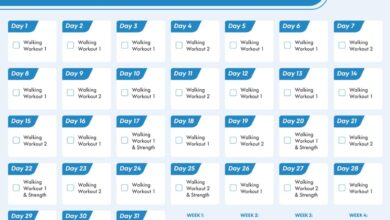
Exercise Helps Your Memory As You Age: A Guide to Staying Sharp
Exercise helps your memory as you age, a fact that’s becoming increasingly recognized as research unveils the profound connection between physical activity and cognitive health. While aging naturally brings changes to the brain, including potential memory decline, exercise emerges as a powerful tool to mitigate these effects and even enhance cognitive function.
This article delves into the science behind how exercise benefits your memory, exploring the different types of physical activity that can make a difference. We’ll uncover the mechanisms by which exercise influences brain health, discuss practical strategies for incorporating movement into your daily routine, and highlight the importance of a holistic approach to cognitive well-being.
The Brain and Aging: Exercise Helps Your Memory As You Age
Aging is a natural process that affects all parts of the body, including the brain. While some age-related changes in the brain are normal, others can lead to cognitive decline, including memory problems. Understanding these changes can help us find ways to maintain brain health as we age.
Brain Changes with Age
The brain undergoes several changes as we age. These changes are typically gradual and vary from person to person. Some of the most common changes include:
- Brain Volume Reduction:As we age, the brain naturally shrinks in size. This is due to a loss of neurons and synapses, the connections between neurons. While this loss is normal, excessive shrinkage can be associated with cognitive decline.
- Changes in White Matter:White matter, which consists of nerve fibers that connect different areas of the brain, also changes with age. The myelin sheath, a fatty substance that insulates these fibers, can break down, leading to slower communication between brain regions.
- Reduced Blood Flow:The blood vessels in the brain can become narrower and less efficient with age, reducing blood flow to the brain. This can affect the delivery of oxygen and nutrients, potentially impacting brain function.
- Changes in Neurotransmitter Levels:Neurotransmitters, chemical messengers in the brain, can decline with age. This can affect mood, memory, and other cognitive functions.
Cognitive Decline with Age
While some age-related changes in the brain are normal, they can sometimes lead to a decline in cognitive function, including memory. This decline is not inevitable, and many older adults maintain sharp cognitive abilities. However, some individuals may experience age-related memory loss, difficulty concentrating, or slower processing speeds.
Brain Regions Involved in Memory
Memory is a complex process involving several brain regions, each with specific roles:
- Hippocampus:This region is crucial for forming new memories, especially episodic memories, which involve personal experiences and events.
- Amygdala:This region plays a role in emotional memory, helping us remember events with strong emotional significance.
- Prefrontal Cortex:This area is involved in working memory, which allows us to temporarily hold and manipulate information. It also plays a role in planning, decision-making, and other higher-level cognitive functions.
- Cerebellum:This region is involved in procedural memory, which involves learning and remembering skills, like riding a bike or playing a musical instrument.
Exercise and Brain Health
Regular physical activity is not only beneficial for your physical well-being but also plays a crucial role in maintaining and enhancing your brain health, particularly as you age. Exercise has a profound impact on brain function, promoting cognitive flexibility, memory, and overall mental sharpness.
The Mechanisms of Exercise and Brain Blood Flow
Exercise improves blood flow to the brain through several mechanisms.
- Increased cardiac output: During exercise, your heart pumps more blood, delivering a greater volume of oxygen-rich blood to the brain.
- Vasodilation: Exercise triggers the release of nitric oxide, a molecule that relaxes blood vessels, widening them and facilitating better blood flow.
- Angiogenesis: Regular exercise stimulates the growth of new blood vessels in the brain, enhancing its vascular network and ensuring adequate oxygen and nutrient supply.
Improved blood flow is essential for optimal brain function, providing the necessary resources for brain cells to thrive and communicate effectively.
Exercise and Brain Plasticity and Neurogenesis, Exercise helps your memory as you age
Exercise promotes brain plasticity, the brain’s ability to adapt and change in response to experiences.
- Synaptic plasticity: Exercise enhances the formation and strengthening of connections between neurons, improving communication pathways and facilitating learning and memory.
- Neurogenesis: Exercise stimulates the growth of new brain cells, particularly in the hippocampus, a region crucial for memory and learning.
Studies have shown that exercise can reverse age-related decline in brain volume and improve cognitive function. For instance, a study published in the journal “Neurology” found that older adults who engaged in regular aerobic exercise showed significant improvements in memory and executive function compared to their sedentary counterparts.
Exercise Types and Memory Improvement

Different types of exercise can have varying effects on memory function. While some studies suggest that any form of physical activity can be beneficial, research indicates that certain types of exercise may be more effective in enhancing memory than others.
Keeping your brain sharp as you age is crucial, and exercise is a fantastic way to do just that. It improves blood flow to the brain, which can enhance memory and cognitive function. And guess what? A healthy lifestyle, including regular exercise, is also key to weight management.
Check out your 7 day guide to forming better habits for weight loss for some tips and tricks. By taking care of your body, you’re also investing in your mental health and longevity, allowing you to enjoy a sharper mind and a better quality of life for years to come.
Aerobic Exercise and Memory Enhancement
Aerobic exercise, which involves sustained rhythmic movements that elevate heart rate and breathing, has been consistently linked to improved cognitive function, particularly memory. Aerobic activities like brisk walking, jogging, swimming, and cycling increase blood flow to the brain, delivering more oxygen and nutrients, which are essential for optimal brain function.
This enhanced blood flow supports the growth of new brain cells, strengthens existing neural connections, and improves communication between brain regions involved in memory.
Exercise and Cognitive Function
The connection between exercise and cognitive function in older adults is a growing area of research, revealing a powerful link between physical activity and brain health. As we age, our brains naturally undergo changes, but regular exercise can help mitigate these changes, promoting cognitive resilience and potentially delaying age-related cognitive decline.
How Exercise Benefits Cognitive Function
Regular exercise can enhance cognitive function in older adults by influencing various brain mechanisms. It stimulates the growth of new brain cells, improves blood flow to the brain, and increases the production of brain-derived neurotrophic factor (BDNF), a protein crucial for brain cell survival and growth.
This, in turn, contributes to improved memory, attention, and overall cognitive performance.
Studies Demonstrating the Positive Impact of Exercise
Numerous studies have highlighted the positive impact of exercise on cognitive function in older adults.
- A meta-analysis published in the journal “Neurology” in 2010, encompassing data from 14 studies, found that regular physical activity was associated with a reduced risk of cognitive decline and dementia. The analysis showed that those who engaged in regular physical activity had a 30% lower risk of developing dementia.
- Another study, published in the “Journal of the American Geriatrics Society” in 2014, investigated the impact of exercise on memory function in older adults. The study found that those who participated in a 6-month exercise program showed significant improvements in verbal memory and working memory compared to a control group.
- A study published in “Frontiers in Aging Neuroscience” in 2017 examined the effect of exercise on cognitive function in individuals with mild cognitive impairment (MCI). The study found that aerobic exercise, such as brisk walking or jogging, was associated with improved executive function, memory, and attention in individuals with MCI.
Exercise Recommendations for Memory Enhancement
Regular physical activity is crucial for maintaining cognitive health, especially as we age. Exercise can help improve memory, attention, and overall brain function.
Exercise Program for Memory Enhancement
A well-designed exercise program can effectively target memory improvement in older adults. This program combines aerobic, strength training, and flexibility exercises, each contributing to cognitive enhancement.
Aerobic Exercise
Aerobic exercise, like brisk walking, cycling, or swimming, increases heart rate and improves blood flow to the brain. This enhanced blood flow delivers oxygen and nutrients, supporting brain health and cognitive function.
You know how they say exercise is good for your brain? It’s true! Keeping active can actually help sharpen your memory as you age. It’s all about those endorphins and the way they help your brain function.
If you’re looking to rediscover some healthy habits, ways to rediscover lost healthy habits can help. Just remember, even a little bit of exercise goes a long way in keeping your mind sharp. So, lace up those sneakers and get moving!
- Brisk Walking:Aim for at least 30 minutes of brisk walking, most days of the week.
- Cycling:Engage in 30 minutes of cycling, at least 3 times a week.
- Swimming:Swim for 30 minutes, at least 2 times a week.
Strength Training
Strength training exercises, like lifting weights or using resistance bands, help build muscle mass and improve bone density. These exercises also stimulate brain activity, promoting memory and cognitive function.
- Weight Lifting:Perform 2-3 sets of 8-12 repetitions of various weightlifting exercises, targeting major muscle groups, 2-3 times a week.
- Resistance Band Exercises:Use resistance bands to perform exercises like bicep curls, tricep extensions, and shoulder presses, 2-3 times a week.
Flexibility Exercises
Flexibility exercises, such as yoga or stretching, improve range of motion and reduce muscle tension. They also promote blood flow and relaxation, contributing to better cognitive function.
- Yoga:Practice yoga for 30 minutes, at least 2 times a week.
- Stretching:Engage in stretching exercises, targeting major muscle groups, for 10-15 minutes daily.
Tips for Incorporating Exercise into Daily Routines
Integrating exercise into daily life can be seamless and beneficial.
- Walk During Breaks:Take short walks during work breaks or after meals.
- Use Stairs:Opt for stairs instead of elevators whenever possible.
- Park Further Away:Park further away from your destination and walk the extra distance.
- Stand Up More:Incorporate standing breaks into your workday, or use a standing desk.
- Find Activities You Enjoy:Choose exercises that you find enjoyable, making it more likely that you will stick with them.
Factors Influencing Memory and Exercise
While exercise is a powerful tool for enhancing memory in older adults, it’s crucial to recognize that other factors significantly impact cognitive function. Diet, sleep, and stress play pivotal roles in shaping our brain health and memory capabilities. These factors interact with exercise in complex ways, influencing its effectiveness in promoting memory improvement.
By understanding these interactions and adopting strategies to optimize these factors, we can maximize the benefits of exercise on memory.
Keeping your mind sharp as you age is important, and regular exercise is a fantastic way to do just that. It’s not just about physical health, though – exercise can also help manage stress and anxiety, which can play a big role in cognitive function.
If you’re struggling with anxiety, understanding the common types of anxiety and how to cope can be a great starting point. Once you’ve got a handle on your anxiety, you’ll be able to focus on those memory-boosting workouts and keep your mind sharp for years to come.
Diet and Memory
A healthy diet rich in nutrients essential for brain function is crucial for maintaining optimal memory.
- Omega-3 fatty acids, found in fatty fish, walnuts, and flaxseeds, support brain cell health and communication.
- Antioxidants, abundant in fruits and vegetables, protect brain cells from damage caused by free radicals.
- B vitamins, particularly B12, are vital for cognitive function and memory formation.
A diet high in processed foods, saturated fats, and sugar can negatively impact brain health and memory.
Sleep and Memory
Adequate sleep is essential for memory consolidation and cognitive function. During sleep, the brain processes information learned during the day, transferring it from short-term to long-term memory.
- Sleep deprivationcan disrupt this process, leading to impaired memory, reduced concentration, and increased risk of cognitive decline.
- Regular sleep patterns, including consistent bedtimes and wake-up times, are essential for promoting quality sleep.
- Creating a relaxing bedtime routine, such as taking a warm bath or reading a book, can signal to the body that it’s time to sleep.
Stress and Memory
Chronic stress can negatively impact memory function. Stress hormones, such as cortisol, can impair the hippocampus, a brain region crucial for memory formation and retrieval.
- Stress management techniques, such as mindfulness meditation, deep breathing exercises, and yoga, can help reduce stress levels and improve memory function.
- Social supportfrom friends and family can buffer against the negative effects of stress.
- Engaging in enjoyable activitiescan help reduce stress and improve mood, contributing to better memory.
Interplay of Factors
The interplay between exercise, diet, sleep, and stress is crucial for optimal memory function. Exercise can enhance the positive effects of a healthy diet, adequate sleep, and stress management, while neglecting these factors can diminish the benefits of exercise on memory.
Exercise and Memory: A Lifelong Approach
Embracing an active lifestyle isn’t just about physical well-being; it’s a powerful strategy for safeguarding cognitive function and enhancing memory as we age. The connection between exercise and memory is profound, and the benefits extend far beyond the immediate feeling of accomplishment.
The Long-Term Benefits of Exercise for Memory
Regular physical activity, regardless of age, offers a wealth of benefits for our brains. Studies have consistently shown that exercise can:
- Boost Brain Volume:Exercise promotes the growth of new brain cells (neurogenesis) and increases the volume of grey matter, the part of the brain responsible for memory, learning, and decision-making.
- Improve Blood Flow:Exercise enhances blood flow to the brain, delivering vital oxygen and nutrients essential for optimal cognitive function.
- Reduce Inflammation:Chronic inflammation is linked to cognitive decline. Exercise helps reduce inflammation in the brain, protecting against age-related memory loss.
- Enhance Neuroplasticity:Exercise enhances neuroplasticity, the brain’s ability to adapt and form new connections. This flexibility is crucial for memory formation and retrieval.
Starting Early for a Healthier Brain
The benefits of exercise for memory are most pronounced when we start early in life. Integrating physical activity into our routines from childhood onwards can help build a strong foundation for cognitive health.
- Early Intervention:Children who engage in regular physical activity have been shown to perform better academically and demonstrate improved memory skills.
- Long-Term Impact:Building healthy habits early in life has a lasting impact on brain health, reducing the risk of age-related cognitive decline.
Exercise as a Vital Component of Healthy Aging
Exercise is not just a recommendation for the young; it’s a vital component of a healthy aging process. It’s never too late to reap the rewards of an active lifestyle.
- Age-Related Decline:As we age, our brains naturally undergo changes that can impact memory. Exercise can help mitigate these changes and maintain cognitive function.
- Cognitive Reserve:Exercise builds cognitive reserve, which acts as a buffer against age-related cognitive decline. This reserve allows our brains to function optimally despite age-related changes.
- Improved Quality of Life:Exercise can improve sleep quality, reduce stress levels, and boost mood, all of which contribute to a better quality of life in later years.
Closing Summary
Embracing exercise as a lifelong habit is a powerful investment in your cognitive health. By incorporating regular physical activity into your routine, you can not only improve your memory but also enhance your overall well-being. Remember, it’s never too late to start reaping the benefits of exercise for your brain.
Whether you choose brisk walking, strength training, or engaging in a favorite sport, every step you take towards movement is a step towards a sharper mind and a more fulfilling life.






